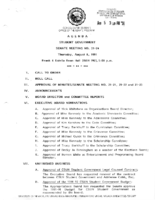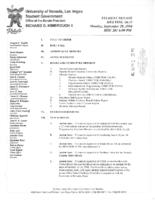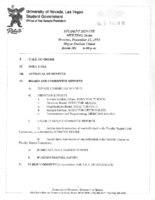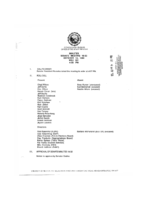Search the Special Collections and Archives Portal
Search Results

Meeting minutes for Consolidated Student Senate University of Nevada, Las Vegas, April 25, 1991
Date
1991-04-25
Archival Collection
Description
Includes meeting agenda and minutes with additional information about senate bills, resolutions, and memorandums. CSUN Session 21 Meeting Minutes and Agendas.
Text

Meeting minutes for Consolidated Student Senate University of Nevada, Las Vegas, August 8, 1991
Date
1991-08-08
Archival Collection
Description
Includes meeting agenda and minutes along with additional information about bylaws. CSUN Session 21 Meeting Minutes and Agendas.
Text

Meeting minutes for Consolidated Student Senate University of Nevada, Las Vegas, September 28, 1998
Date
1998-09-28
Archival Collection
Description
Includes meeting agenda and minutes and a senate bill.
Text

Meeting minutes for Consolidated Student Senate University of Nevada, Las Vegas, December 11, 1995
Date
1995-12-11
Archival Collection
Description
Includes meeting agenda and minutes and information about senate bills and bylaws.
Text

Meeting minutes for Consolidated Student Senate University of Nevada, Las Vegas, October 12, 1989
Date
1989-11-12
Archival Collection
Description
Includes meeting agenda and minutes.
Text

Interview with Byron Leo Ristvet, April 17, 2006
Date
2006-04-17
Archival Collection
Description
Narrator affiliation: Containment scientist, Defense Threat Reduction Agency, Dept. of Defense
Text

Interview with Philip Lyle Ulmer, January 11, 2005
Date
2005-01-11
Archival Collection
Description
Narrator affiliation: Manager, Protective Force, Wackenhut Services, Inc.
Text

Interview with Dale Fraser, March 2, 2005
Date
2005-03-02
Archival Collection
Description
Narrator affiliation: General Manager, Reynolds Electrical and Engineering Company (REECo)
Text

Interview with Linda (Mack) Smith, October 6, 2006
Date
2006-10-06
Archival Collection
Description
Narrator affiliation: Deputy Manager Nevada Operations Office, U.S. Department of Energy; Nevada Test Site Historical Foundation
Text

Interview with Robert Nelson, June 30, 2004
Date
2004-06-30
Archival Collection
Description
Narrator affiliation: Deputy Manager, Department of Energy Nevada Operations Office; Episcopal Priest
Text
Pagination
Refine my results
Content Type
Creator or Contributor
Subject
Archival Collection
Digital Project
Resource Type
Year
Material Type
Place
Language
Records Classification
